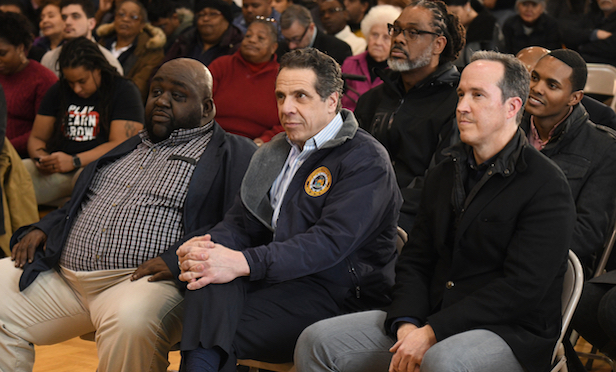
NEW YORK CITY—Judge Carol R. Edmead of the New York State Supreme Court earlier this week had granted a preliminary injunction requiring emergency lead paint inspections of thousands of NYCHA apartments. The Citywide Council of Presidents, a group acting on behalf of NYCHA tenants, and the non-profit At-Risk Community Services, Inc., filed a lawsuit against NYCHA and its chair, Shola Olatoye, in February. The lawsuit alleges failure to protect the public housing tenants from toxic lead, mold, vermin, roaches, violent offenders engaging in criminal activity, and failing to provide heat and hot water.
Olatoye had resigned on April 9, effective at the end of this month. Michael Kelly, who had been NYCHA's general manager, resigned at the end of February and in March accepted the job of COO and EVP at the Brooklyn Navy Yard Development Corporation.
Justice Edmead announced her findings after oral arguments in which Jim Walden, an attorney at Walden Macht & Haran representing CCOP and At-Risk Community Services, argued NYCHA was legally required to inspect apartments for toxic lead but did not. A report by the city's Department of Investigations indicated from 2013 to 2016 NYCHA had falsely certified compliance with lead paint safety inspections with the federal government. The judge stated NYCHA must identify the apartments that required these inspections and inspect them within 90 days.
As part of the stipulation filed on Wednesday, NYCHA agreed to waive its rights to a hearing on the plaintiff's motion for a preliminary injunction that was originally scheduled for Monday. In the agreement, the parties also consented to the filing of amicus briefs submitted by city council members, Ritchie Torres, Laurie Cumbo and Alicka Ampry-Samuel. In addition, the deadline for NYCHA's response to the complaint was extended to May 25, to allow parties to have settlement discussions.
“While I had relished the opportunity to cross examine many of NYCHA's most senior executives and managers, past and present, at Monday's hearing, we are pleased that NYCHA's decision to extend an olive branch will expedite relief for the hundreds of thousands of tenants living in third-world conditions right here in New York City,” says Walden.
GlobeSt.com is awaiting responses from the city and NYCHA and will update this article upon receiving comments or additional information.
Governor Andrew Cuomo had visited NYCHA housing including the Andrew Jackson Houses and the Taft Houses and called the conditions “disgusting,” “intolerable” and “the most egregious I have ever seen.” He allocated $250 million from the state budget to address some of the grievances set forth in the complaint.
The lawsuit seeks to have an independent contractor apart from NYCHA perform the housing repairs and improvements. It requests oversight of the contractor by CCOP, the elected representatives of the housing authority tenants. Finally, it asserts federal law requires that NYCHA tenants receive meaningful work and economic opportunities arising from the contracts.
© Touchpoint Markets, All Rights Reserved. Request academic re-use from www.copyright.com. All other uses, submit a request to [email protected]. For more inforrmation visit Asset & Logo Licensing.







